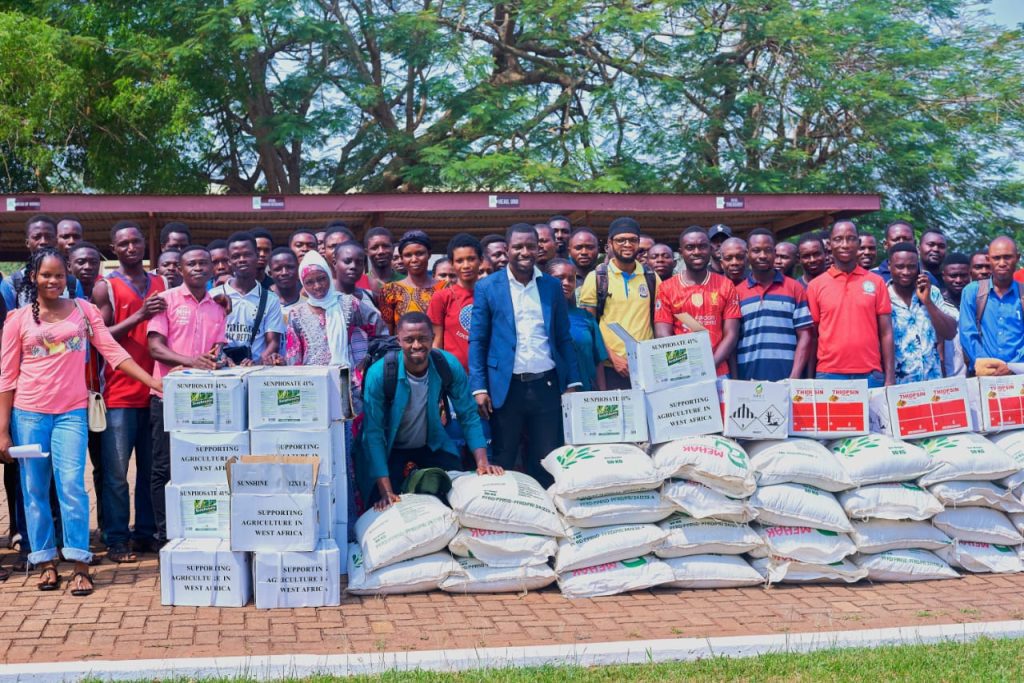|
Getting your Trinity Audio player ready...
|
The Kosmos Innovative Center project of the Akenten Appiah-Menka University of Skills Training and Entrepreneurial Development (AAMUSTED) has trained 220 young farmers on climate smart agriculture.
It also provided the young farmers between 18 and 35 years with essential farm inputs including fertilizers, pesticides, weedicides, fungicides, and seeds aimed at enhancing productivity. The implementation of the project followed a Memorandum of Understanding (MoU) signed between the KIC and the University for collaborative relationships on various areas of agricultural, agribusiness, capacity-building interest, and mutual benefit.
Signed in 2024, the project aimed at supporting young ‘agripreneurs’ and start-up organizations in the agribusiness value chain and other business-related areas.
Speaking at the closing session of the training held at the University’s main campus at Mampong in the Ashanti Region, Dr Benjamin Aboagye Danso, the Faculty Advisor of the KIC AAMUSTED project, indicated that the project was expected to create an enabling environment for sustainable farming among the youth between 18 and 35 years to promote food security and ensure poverty reduction.
“As part of its ongoing efforts to equip young farmers with knowledge and resources needed for sustainable agriculture, the project implementation team of the KIC AAMUSTED Project, under the Young Farmer Business Academy Initiative (YFBA) trained the farmers,” he stated.
Dr Danso reiterated that the project would improve technical and agronomic capacities of farmer groups, especially women and youth groups for sustainable food production through the input support approach highlighting its necessity to curb the challenges young farmers face in terms of initial investment capital at the beginning of the farming season.
Mr Ebenezer Abankwah, the project officer of KIC, stressed that the initiative would improve the livelihoods of smallholder farmers, especially young women, and youth by increasing productivity, market access and creation of new jobs. The project also seeks to improve income opportunities and enhance the resilience of the farmers on value chain activities, thereby contributing to food security, poverty reduction and economic growth.
In an overview, Dr Benard Effah, the Technical Lead for the YFBA initiative, explained that the implementation of the project was necessitated by the nation’s overreliance on food imports to meet domestic demand, despite the vast arable land and favourable climatic conditions to produce these food items.
That situation, he added, had contributed to a high import burden and worsening exchange rate, leading to a high cost of living, emphasizing that by “this initiative the next generation of agripreneurs will be well-equipped for success, fostering a more resilient and productive agricultural sector”.
Professor Dr Isaac Abunyuwah, who represented the university management, highlighted the importance of such programmes in enhancing the agricultural sector and improving the livelihoods of young farmers. “The event marks another significant milestone in the university’s efforts to support and promote sustainable agriculture among the youth,” he stated.
Mr Emmanuel Baah, the Mampong Municipal Deputy Director Agriculture also provided valuable insight on sustainable farming techniques that were crucial in adapting to climate change and improving agricultural productivity. The training also allowed participants to share their insights on sustainable farming practices as well as their concerns about the modalities of the project.
Source: GNA

